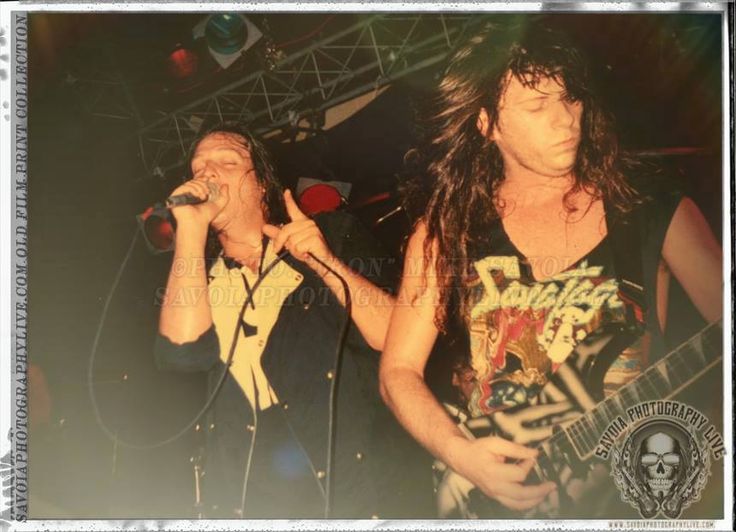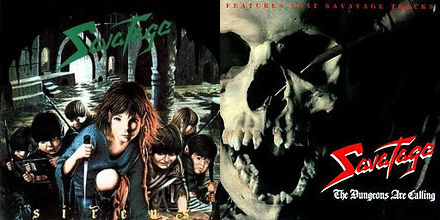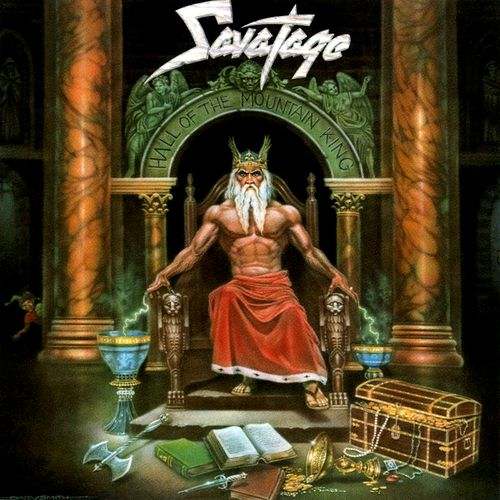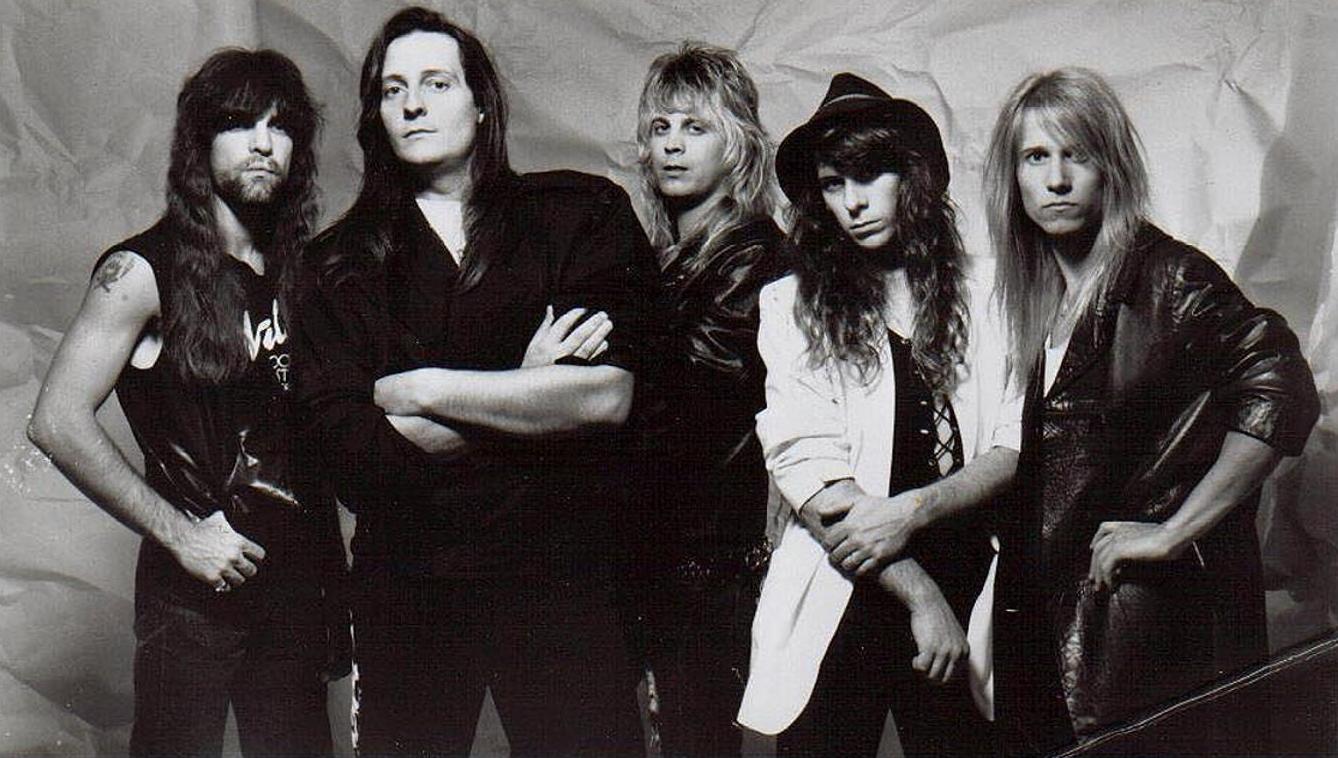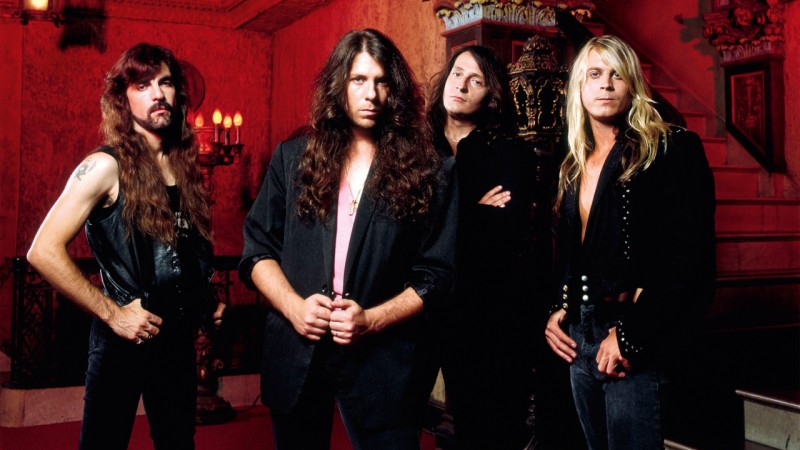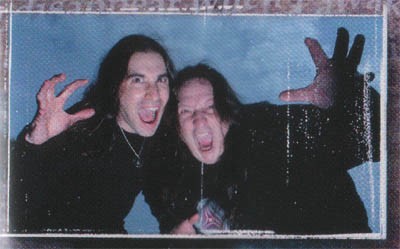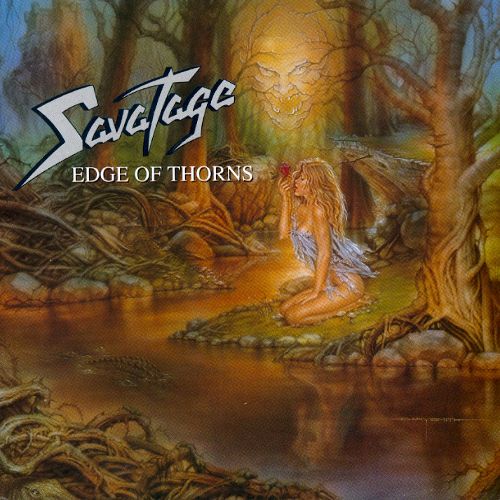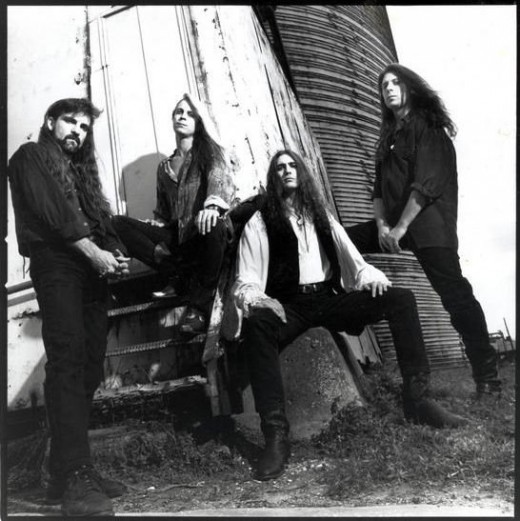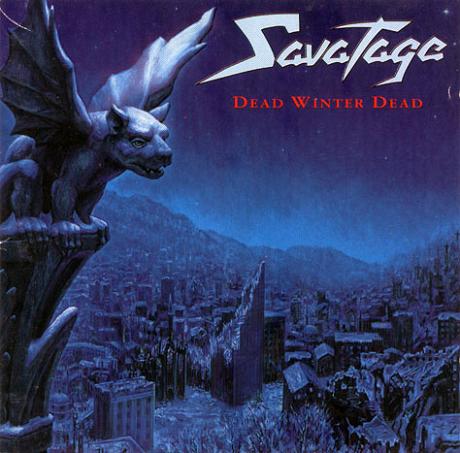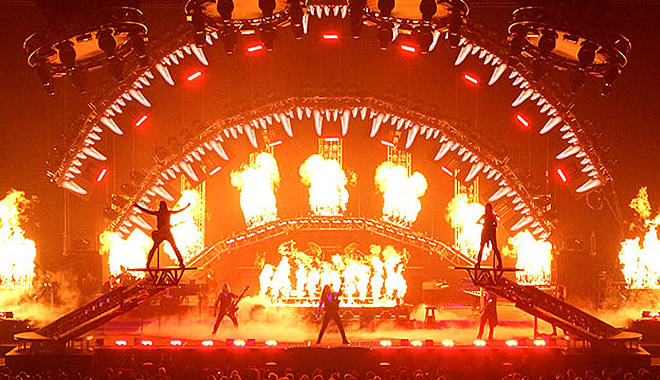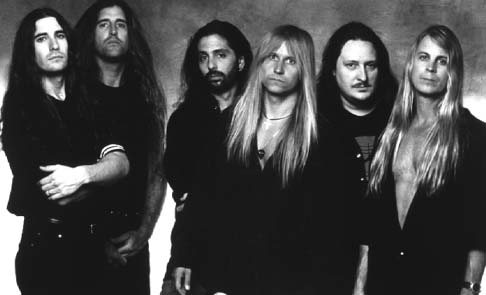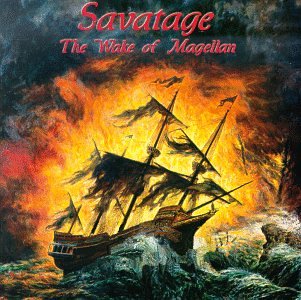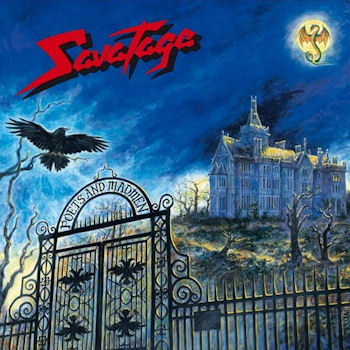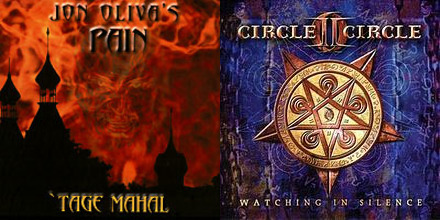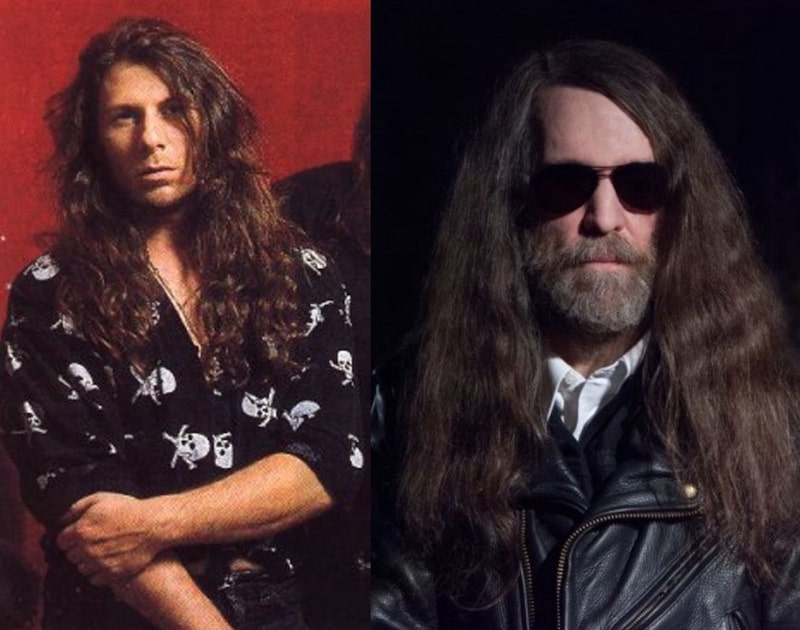
To be perfectly honest, I’ve been meaning to write an article about Trans-Siberian Orchestra (TSO) for a long time. TSO evolved from one of my favorite heavy metal bands, Savatage, and I thought it would be a great way of introducing people to Savatage since TSO is so well known. I was waiting for Christmas time to write it because that’s the season in which TSO mainly tours. But I decided there’s no sense in waiting. Due to recent tragic news of Paul O’Neill’s passing, I want to do it now. Paul worked with Savatage for a long time as a producer and co-writer, and he was also the co-creator and producer of TSO until his passing. He and everyone who’s been involved with Savatage and TSO deserve all the praise they get. I want to pay my tribute to him. I also want to pay tribute to one of the founders of Savatage, an immensely talented guitar player we lost way too soon, Criss Oliva.
I don’t want to frame this as a biographical piece, although there will be parts that will feel like that for sure. After all, I need to give you some background. I’ll try to tell you why you should take the time to discover Savatage albums and why they deserve the word “unique” more than any other band you’ve ever heard. Chances are, you’ve heard of Trans-Siberian Orchestra. Maybe you even saw them live at some point. But a lesser known fact is that TSO is pretty much Savatage with the addition of an orchestra! But I’ll get to that shortly…
In 1979, two brothers, Jon and Criss Oliva, formed a band called Avatar in Florida. Jon, the older brother, had tried drums and bass in previous bands but later decided he was going to focus on keyboards and vocals. Criss, on the other hand, was an outstanding guitar player whose style was going to be one of the key aspects of the band’s future sound. The Oliva brothers would soon be joined by Steve “Doc” Wacholz on drums and Keith Collins on bass. In 1981, they were already playing local clubs and getting ready to record an album with this line-up. But prior to the release, they had to change the name of the band to Savatage due to the fact that another band with the name Avatar had already existed. Savatage was a combination of the words “Avatar” and “Savage”.
After playing the club scene for years, Savatage was eager to start recording in 1983. But because they were not yet well known, major labels were out of the question at the time. So they signed with a smaller independent label. The problem was, they didn’t have enough money to reserve comfortable studio time. They had 24 hours to record and mix the entire album! I’ve always thought early Savatage had a nice, raw, fresh sound to it — and this explains why. These songs were supposed to make one album; that was the intention. But at the time, it was too long to make one LP. So, in the end, Sirens (1983) was released as the band’s debut album. And later, The Dungeons Are Calling (1984) was released as a long EP.
The songs on the first two records were some great examples of Criss Oliva’s guitar playing and how dominant it was in Savatage’s sound. You don’t really hear the progressive elements the band came to be known for just yet — they were rather focused on delivering some impressive hard rock and heavy metal. But even if you could categorize the music as metal; it’s not really like any other band of the same era. Jon and Criss were into rock bands like Uriah Heep, Queen, Deep Purple, Rainbow, and UFO — all bands that had a progressive edge. Furthermore, they were also getting into the new wave of metal from bands like Venom, Motorhead, and Accept. It was this open-minded approach, combined with Criss’s unique guitar playing and Jon’s powerful, raspy vocal delivery, that granted Savatage whatever genre label they pleased!
Soon, they were opening for Zebra while supporting the first two records. Savatage, as Jon mentions, was just a bunch of guys who wanted to get a record out and see where it went. They still had their day time jobs at this point. But they would find out shortly that Sirens quickly sold out and they were already getting fan letters from even outside of the US. More importantly, someone from a major label — Atlantic Records — was in the audience. Zebra was signed to Atlantic and executives were there to watch. They were so impressed by Savatage that they immediately wanted to sign the band. It was happening. They were no longer a small band on a small label. They were now full-time musicians on a major record label.
The first album Savatage released under a major label was Power of the Night (1985). From a songwriting perspective, it’s similar to the first two — it’s still in the vicinity of heavy metal and hard rock. But the difference here is the production values. They were on a major label after all! The band worked with Max Norman, who would later go on to work with Megadeth, and had more time in the studio to really improve the mix. You could now clearly hear Criss Oliva’s guitar work — especially his lead playing. From a lyrical perspective, the band still had some learning to do since they were sticking to some rock and metal clichés — but then again, those clichés work perfectly with the heavy sound so who could argue? Savatage was now getting more attention. They weren’t as big as they wanted to be but both the band and the record label saw the potential.
The next move, however, proved how different the label and the band saw the future. Atlantic Records asked Jon Oliva to write more commercially accessible songs for other artists on the label, including John Waite. Oliva put the material together — but then the label changed its mind. They were now telling him that they wanted Savatage to record and release these songs under their name. The band, although reluctant at first, was swayed by promises of making them more famous and richer. In the end, they agreed. But the result, an album called Fight for the Rock, left such a bad taste in everyone’s mouths that the band started calling it Fight for the Nightmare! Not only were the new songs more stripped down for radio-friendly appeal; but the band re-released old songs like “Fighting for Your Love” except they changed it to Crying for Your Love based on the record label’s request and softened the music around it too. The label was so focused on pulling all tricks for commercial success that they even put the “Explicit Lyrics” sticker on the album to make it look “dangerous” despite the fact that there was no word in the lyrics that warranted the label. I became aware of this album much later than the others because the band rarely ever talks about it. Savatage has such a stellar discography that this album stands out as the only album where mainstream success was a major concern and it doesn’t sit well with most fans. I’d say it’s still worth a listen for what it is. All metal bands go through this dilemma at one point or another. You’ve got to be able to look at it as a snapshot in time.
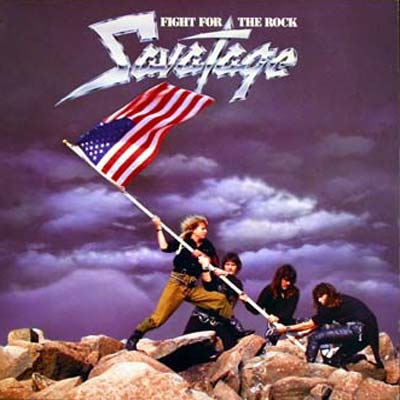
And if you are still upset over Fight for the Rock, here is one amazing silver lining that came out of it all. A talented and ambitious producer, Paul O’Neill, met the band for the first time while the band was still promoting the album. He’d heard of the band but he hadn’t heard their music yet. So he flew down to Florida to watch one of their live shows. He met the band afterwards and told them how impressed he was with their music. Paul O’Neill was looking for a band that would be bold enough to push the boundaries of musical genres. This sounded appealing to Savatage as they were eager to expand their sound. Jon Oliva says Paul saw something in them and thought Savatage could be the first progressive metal band. With that, O’Neill’s long-running relationship with these talented group of musicians began.
“Paul came in at the lowest point of our career, and in my view, really saved the band. I think he was looking for a band that could really push the envelope and do something different, and we fit the bill. We had a great guitar player who could play anything, good vocals, and our musical backgrounds were the same. We loved all the same bands, and we told Paul how we wanted to grow, to try new things and expand our sound. Paul told us he saw something in us, and he thought that we could be the first progressive metal band.”
And Paul O’Neill was ready to push the band. He wasn’t only producing the next album that later became Hall of the Mountain King (1987), but he also started helping them with lyrics. The album overall keeps its heavy metal edge, with a “back to roots” kind of sound deliberately chosen to remedy the effects of the previous record. But even when compared to earlier heavy records of Savatage, you hear a more consistent sound, a more mature approach to songwriting. They sound like a more cohesive unit.
As the band was busy writing the album, the biggest challenge came when O’Neill asked them if they would consider doing a version of Edvard Grieg’s “In the Hall of the Mountain King”. A classical song covered by a metal band? They had to think about that! Keep in mind Savatage had just gotten out of the Fight for the Rock adventure, so they were not exactly in the right frame of mind to take another risk. Ultimately, Paul O’Neill convinced them to give it a try. According to Jon Oliva, whenever O’Neill had a new idea he wanted the band to try, he would tell them he was just “peeking” and that it didn’t “hurt to peek”. Well, it worked right from the start! While the entire album is regarded highly in many fans’ minds, it is perhaps the title track and the prelude (Prelude to Madness, as the band called it) that set the tone for what was to come. With Prelude, which is where they interpreted the classical piece in their own way, Savatage was sending early signals of what they were capable of. They were more than just another metal band, they could take classical pieces and turn them into progressive metal masterpieces. And with the title track, ironically not the interpretation of the classical tune but rather an original Savatage track, they were telling the whole world that Criss Oliva’s guitar playing had no limits and Jon Oliva had so many tricks up his sleeve when it came to vocals.
Hall of the Mountain King is where the relationship with Paul O’Neill started and where his influences on the band started to show. If you listen closely, the very early signs of Trans-Siberian Orchestra were there too. Fans were in for a treat! Furthermore, Savatage was gaining traction now! “24 Hours Ago” was getting a lot of airtime on MTV’s Headbanger’s Ball and the band was now playing in more mainstream arenas.
What came next was Gutter Ballet in 1989. To me, it has a similar sound to Hall… but perhaps with a bit more progressive approach. The arrangements are more complex and the lyrics are deeper. I think the band was getting more comfortable in their own skin and the relationship with Paul was no longer “new” so they were ready to push each other even further. The title track is one of the best-known songs from these guys and is a great example of who they were. It’s the best summary of the progressive direction into which they were going, exploring how piano could be used in their sound, how Jon Oliva could expand his vocal style and how they could tell a story in the lyrics. Other highlights for me were “Silk and Steel” where Criss Oliva plays beautiful melodies on acoustic guitar, “Of Rage and War” where the band gets political with fiery riffs, and “Mentally Yours” where they show some pure heavy metal with some amazing guitarwork from Criss.
As I alluded in the last paragraph, the lyrics were getting a little deeper. The band had now started telling stories of fictional characters. And even though this album is not a concept album, the last 3 songs follow the same storyline about a man who has mental health issues stemming from childhood, ending with the haunting “Thorazine Shuffle”. This is important to note because Paul O’Neill was big on storytelling. Here, his collaboration with Savatage led to a suite of 3 tracks, but they were only getting started.
I should mention here that right around this time, Chris Caffery was hired as the second guitar play for the tour supporting Gutter Ballet. Shortly after, he officially joined the band. After the tour was done, however, he left the band citing personal reasons. Of course, as we all know now, he re-joined Savatage years later and is still today an active member of Trans-Siberian Orchestra.
As the ’90s approached, Savatage was ready to tackle yet another challenge: their first concept album! Paul O’Neill had a screenplay he’d written about a painter. The band liked the story but made one change — our protagonist was going to be a rock star! Thus, Streets: A Rock Opera (1991) was born. The story covers the life of a rock star named DT Jesus (short for Downtown or Detox) and the ups and downs he goes through. He starts out as a drug dealer in the streets of New York and then rises to fame as a rock star; but falls again as he deals with fame. At one point, he finds himself completely alone, contemplating his life and the mistakes he made. But despite the hardship our character goes through, the message the band wanted to convey was rather positive. They explained in a video interview that the main idea behind the concept was that “if you believe in yourself, and not get sidetracked by people who try to use you, then you can achieve whatever you want.” They emphasize that point with the last song on the album, “Believe”.
Savatage originally intended to have spoken segments on the album to tell the listener where they were in the story before each song started. That idea was denied by the record company, with the exception of Jesus Saves, where you get to hear about DT Jesus. In 2013, the band released the narrated version of this album, so luckily that’s available now.
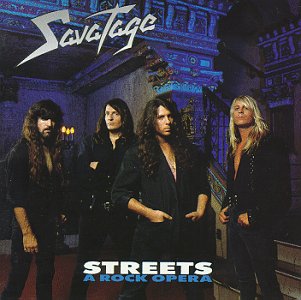
And it wasn’t just the lyrics that was new territory for the band, it was also the music! They didn’t have the words “rock opera” on the album title for nothing! Streets blew my mind the first time I heard it and I’m still fascinated. Savatage took their progressive approach one step further and started incorporating more keyboards, different tempo changes, orchestration, and even a choir! The genius of Streets was that Savatage created the music that the story needed, not what the fans would demand or critics would like. Jon Oliva plays a few different characters throughout the story and I love the execution of all that. He’s not just a “metal” vocalist here, he’s a singer of songs! Whatever the song needs. I don’t think I can name one song as a favorite but “Jesus Saves”, “Agony and Ecstasy”, “Ghost In The Ruins”, “Strange Reality” and “You’re Alive/Sammy and Tex” are all just amazing — and they’re so different from one another! The last track on the album, as mentioned earlier, is “Believe”. It’s one of the band’s most popular songs with some heavy lyrics that deal with the importance of believing in yourself even when you think your life isn’t where you thought it would be. It nicely ends the album on a positive note about keeping the faith alive.
After the Streets tour was done, Jon Oliva revealed to his bandmates and Paul that he wanted to step down from his vocal duties. He had been using his raspy, screaming vocal style for 3 years straight with all new records and tours, and he felt like the power in his voice was not what it had been before. Furthermore, he blamed his unique vocal style for Savatage not breaking through into American rock radio. He thought this would be best for everyone. He could get some rest, get his voice back, stay off booze, and still keep busy with writing material for the band he co-founded. And for Savatage, a new vocalist could potentially mean getting more recognition and increasing sales. So, the search was on. They decided they were not going to get a Jon clone, but rather go for someone who had his own style and who could add a new dimension to their musical style.
They went through many audition tapes, and eventually found Zak Stevens who was recommended by Criss Oliva’s former guitar tech and longtime friend, Dan Campbell. Zak was a young man in a band called Wicked Witch at the time. He was fairly inexperienced as far as recording and touring went, but the band immediately recognized his talent and after Paul O’Neill gave his approval too, he was officially in Savatage as their lead singer.
With their new singer, the band started working on their follow-up to Streets. Pre-production took much longer this time around since they had to adjust their writing style to fit Zak’s voice. But soon, creative juices were flowing! They made a conscious decision to make the album much more guitar-oriented than its predecessor. There were two reasons for that. One, with Streets they’d already done a choir and keyboard-heavy album and they wanted some variety; and two, with Jon assuming a smaller role, it was Criss Oliva’s time to shine!
Edge of Thorns (1993) isn’t a concept album and the songs talk about a variety of topics, but you sense the Paul O’Neill touch — there are stories about alcohol addiction, struggles of people in poverty, TV preachers who steal people’s money promising them heaven, and carving your own destiny in a different way if you don’t like where you’re headed. The album title had a poetic meaning they all loved. O’Neill explains in the album’s liner notes that the edge of a thorn is the sharpest point — the point that may actually cut you. But when you think about it, thorns tend to surround beautiful things. Ah, that kind of contrast is a wonderful treasure for lyricists! So, they ran with the idea for the title track. It talks a little bit about that concept within the context of a love story. Certain memories with someone may be a thorn, something you may want to forget. But if it’s surrounded by beautiful things, balancing that act is going to be difficult as the edge of the thorn is very small.
Savatage fans have different views on what the “best” Sava album is. My observation is that most go with an album in which Jon sings. Of course, Jon’s an iconic frontman and I absolutely love his vocals. And you can’t ignore the brilliance of Streets or Hall… but my favorite album has always been Edge of Thorns. There isn’t any dull moment here, and the singing and guitar playing are some of the best you can ever hear in the world of heavy metal. In terms of songwriting; this is the band at its peak. They were creating some wonderful music. Jon contributing musically, Criss stepping up to the plate with riffs, solos and new ideas to finish his brother’s songs, and Paul getting new inspiration every day to write lyrics and push Zak into a new vocal territory every day. Seriously, just listen to “Skraggy’s Tomb” and “He Carves His Stone” and tell me those aren’t some of the best songs you’ve ever heard!
A new vocalist with a wide range, a guitar-oriented album showcasing Criss’ impressive guitar playing, and a more straightforward songwriting… And finally, they were getting some attention from rock radio. The title track was playing on a lot of stations, so much so that the band started noticing even little kids were singing the lyrics having picked up on them in their parents’ car! This led to a successful tour, starting in their hometown in Florida. Everyone in the band seemed happy. There was huge potential for this band and for a while it seemed like they could take on any challenge. The record company was even gearing up for a special promotion for the acoustic ballad “Sleep”.
Unfortunately, none of those were meant to be. In the early hours of October 17th 1993, as Criss was driving back from the Annual Livestock Festival with his wife Dawn, a drunk driver crossed a median on the road and struck Criss’ car. Dawn was rushed to the hospital but Criss Oliva died at the scene. He was only 30 years old.
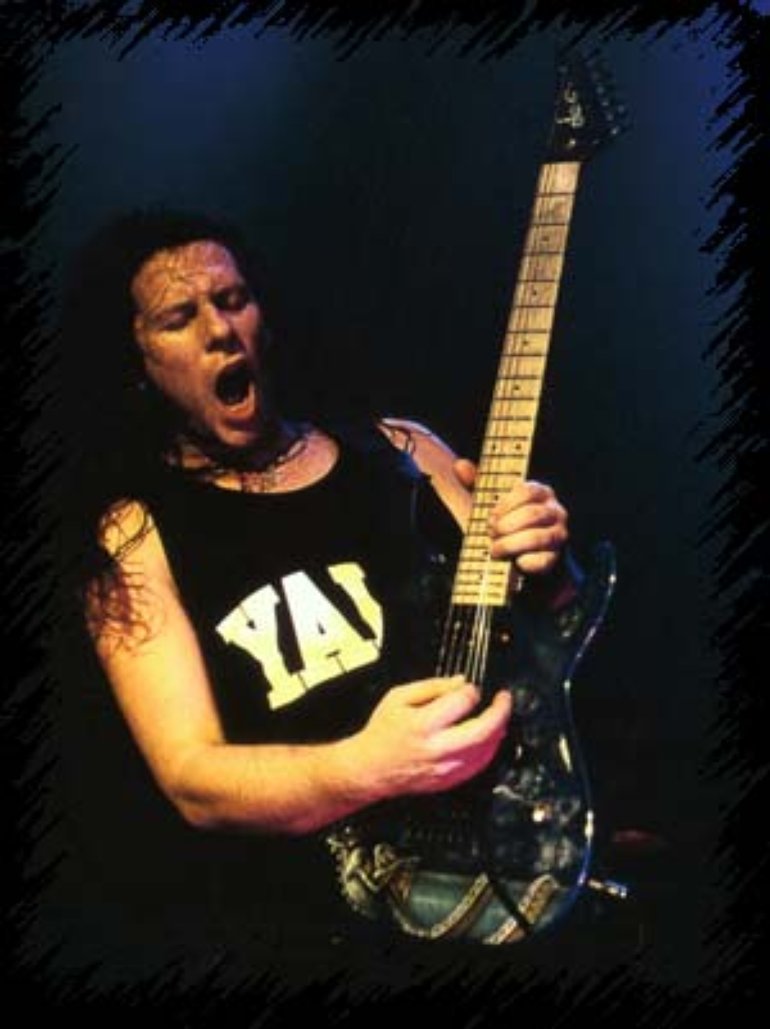
The first time I listened to Savatage was back in 2000. I bought a best-of compilation which went through the band’s catalog in chronological order. I remember immediately being amazed by how impeccable the guitar playing was. As much as I loved Jon’s vocals, his voice took me a while to get used to. But that was never the case with Criss’ sound. You listened to his solos and you’d know there was no guitar player like him. You’d hear a riff like “Agony and Ecstasy” or “Power of the Night” and know for sure it was him. There was no mistaking his phrasing! I remember talking to a like-minded guitar nerd in high school about Criss Oliva and we were talking about how charismatic he looked on stage with his guitar and how he was made for the rock-star life. There are certain musicians that are important to me because I grew up with their music and their songs mean a lot to me. It is for that reason their deaths are also hard to stomach. Especially when you know that a drunk driver caused all of this and took an innocent life. But, as Jon Oliva and Paul O’Neill later said, the best way to honor his memory is to make sure his music is alive and well. I love the music; so, for 17 years I’ve been doing exactly that. And I am writing this to reach as many people as I can so they, too, can discover the genius that Criss was.
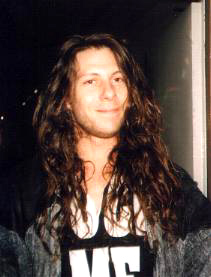
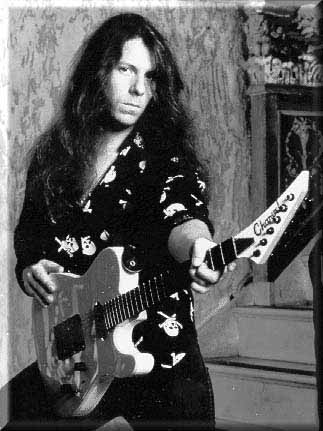
After Criss’ funeral, Jon was faced with a tough decision regarding the future of the band. Ultimately, he decided to continue. He points out in the liner notes of Edge of Thorns that he and his brother promised each other that they would continue if something happened to one of them. The brothers thought they’d put in too much in the band to let it go. Furthermore, Jon decided that if young generations were to discover Criss’ music, the best way to do that would be with the continuation of the band so the new material could spark interest and make people discover the earlier releases.
Jon and Paul started working on some new music in 1994 and Savatage released Handful of Rain in August. Some members were still too shaken by the news of Criss’ death and some members hadn’t really joined yet. So, the line-up wasn’t exactly clear. Despite the fact that Johnny Lee Middleton and Steve Wacholz were both credited as having performed on the album, in reality neither played on the record. Jon Oliva assumed drumming and bass duties, as well as laying down all rhythm guitar tracks. Later, Alex Skolnick was asked to play solos on the album (he did the subsequent tour too) and Zak Stevens delivered the vocals. You can tell musically that the band wasn’t as dedicated as the previous efforts, which, given the circumstances, was completely understandable. I just feel like that in general some songs didn’t really grab you the way songs in earlier releases did. Still, I think there are some gems that should not be overlooked. “Taunting Cobras” is a super heavy opener, “Handful of Rain” features some great rhythms by Jon and I’ve always loved Zak’s singing here, “Chance” became one of the band’s classics and sees Savatage going back to orchestration and Zak layering multiple vocal tracks very much in the style of Freddie Mercury, and the band paying tribute to Criss with “Alone You Breathe”.
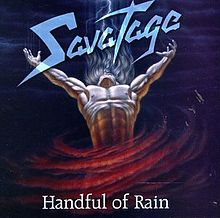
A year later, we were slowly starting to get into Trans-Siberian Orchestra territory… The Bosnian war was devastating the region and the images that Paul O’Neill saw on TV and newspapers deeply affected him. Dead Winter Dead (1995) is another concept album from the band, telling us the love story between a Serbian boy and a Bosnian Muslim girl in the middle of this war. In the album’s liner notes, they mention that this was based on a true story. Throughout the album, they talk about the ugly side of war, but they also mention heroes who tried to save others despite the horrible circumstances.
Musically, this is where Savatage embraced their progressive side once more. The line-up now included Al Pitrelli, Chris Caffery, and Jeff Plate. Oliva provided keyboards and assumed lead vocal duties on two songs, with Zak handling the rest. There’s some heavy tracks; but mostly I see this as similar to Streets not in terms of songs, but in terms of the overall approach to songwriting.
Coincidentally, this is also where Trans-Siberian Orchestra started…
While writing the story for the album, Paul O’Neill heard about a cellist who was performing during the shelling of Sarajevo. “He was a single individual trying in his own way to keep alive the spirit of humanity”, Jon Oliva later said. O’Neill was immensely inspired. Here was a man who’d returned to Sarajevo after a long time, only to find it in ruins. But even then, he wouldn’t give up, he would keep playing his cello… Paul soon found out that this cellist had a song called “Christmas Eve / 12–24” based on the Ukranian/Slavic song “Carol of the Bells”. He completely re-arranged it and added some rock elements into it too. According to Oliva, each instrument section had a meaning: the orchestra represented the Bosnians, the rock band represented the Serbs, and the cello itself represented the “better angels of humanity”.
So, this was song #12 on the album. Its re-worked title was “Christmas Eve (Sarajevo 12/24)”.
Ever since Edge of Thorns had reached a certain level of commercial success; the band was hoping to reach that level again, but it wasn’t happening. Then, they decided to release Christmas Eve as a single…
And that changed everything! As the Christmas season started in 1995, several US radio stations picked up the song. Now, most stations were getting requests and the single was getting played more and more. Suddenly, there was a massive interest. According to a Guitar World report, Dead Winter Dead quickly sold out due to the demand in the song — but the record company couldn’t replenish the supply until after the holidays, and the momentum for the album was gone.
But this was enough to give Paul O’Neill a new idea. If there was demand for symphonic rock with a Christmas theme, who better to do it than the musicians in Savatage? After all, they’d done a lot of progressive songs before. He quickly started putting together a story with a Christmas theme and the music came soon after. The guys in Savatage were on board. They had worked with orchestras before but this was going to be a whole album’s material with an orchestra. And since this was completely new territory and they didn’t want to alienate Savatage fans, they needed a new name for this project. They went with Trans-Siberian Orchestra, which O’Neill had already formed a few years prior but hadn’t really fully fleshed out until “Christmas Eve (Sarajevo 12/24)” showed what kind of demand there was for this music.
The name borrows some influence from the Trans-Siberian Railway. O’Neill loved the contrast between the harshly unforgiving conditions of Siberia and the relative safety of being on this railway to get where you need to go. Life, he concluded, is a little bit like that with some harshness, but we have music for some relative safety.
TSO released its debut album, Christmas Eve and Other Stories, in 1996. Needless to say, the album did extremely well in terms of commercial success. It’s currently at #9 in the Top 25 Chrismas/Holiday Albums of the Nielsen SoundScan era.
The newly formed Orchestra’s mainstream success was a bit of a double-edged sword for Savatage. One the one hand, since all musicians were involved in one way or another, it was a way for them to make some decent money. And it was pretty much still Savatage — just with more musicians chiming in! But on the other hand, they were feeling the frustration of putting so much time and effort into Savatage, releasing all these quality albums that pushed the boundaries of genres, but never really getting the recognition they deserved. This would later cause them to abandon Savatage altogether, but for now, they continued on.
In 1997, Savatage released one of my favorites, The Wake of Magellan. This is the first album to have the same line-up as the previous one since Streets, which had the same line-up as Gutter Ballet. It’s also the band’s third concept album. This time, we have the story of a sailor who is dealing with storms. And while he’s dealing with his own life’s questions, he comes across a stowaway who needs saving and leaves his own tribulations behind and appreciates life more. As you can notice, Paul O’Neill tends to like these themes of going through ups and downs but his stories end up on a positive note. It is said that his inspiration for this album were the 1996 Maersk Dubai incident, as well as the assassination of Irish crime reporter Veronica Guerin who was murdered by drug lords in Dublin.
Musically, The Wake of Magellan is excellent. I know most fans would disagree, but it’s on the same level as Streets and Edge of Thorns, as far as I’m concerned. The music is a little bit heavier than Dead Winter Dead but keeps a progressive edge, especially on the title track as well as the 8-minute epic “The Hourglass”. It takes you on a real journey through the music, you have some acoustic parts, and then, when the story depicts all the storms, you’ve got the accompanying heavier music that takes you right there! And I think the guitar-duo of Caffery/Pitrelli really found their sweet spot here as I really love the solos and all the little leads here and there. I think this one is the best Savatage release after Criss’s passing.
In the late ’90s and early 2000s, Savatage camp was fairly quiet except for some live shows, but TSO released two more albums; The Christmas Attic in 1998 and Beethoven’s Last Night in 2000. Around this time, Zak Stevens left the band and Al Pitrelli joined Megadeth. Despite the line-up change, Savatage decided to record their next album as a 4-piece band. Jon Oliva went back to assuming all lead vocal duties, along with keyboards. And Chris Caffery assumed all guitar duties, except for some solos Pitrelli had recorded before he officially departed. They released Poets and Madmen in 2001. As it stands now, this is the last Savatage studio album. It’s not a concept album as far as I know, although some sources say certain songs are loosely based on the life of photojournalist Kevin Carter. Musically, there’s a big diversity here. For some reason, I get a similar vibe as Handful of Rain on this one. “Morphine Child” is one of the most ambitious songs the band has done which runs at about 10 minutes and goes through a few different tempo changes and it’s one of the most challenging vocal duties Jon’s taken. My favorites are “I Seek Power”, “Drive” which reminds me of “Lights Out” from Edge of Thorns, “The Rumor” which has an insane groove when the distorted guitars kick in, and “Awaken” which has a great bass line and is an overall super catchy song.
After Poets and Madmen and the live shows supporting it with a new touring line-up, some members started working on their own projects. Unfortunately, Savatage wasn’t gaining much financial success and the members were having to put a lot of their earnings back into each new project. Ultimately, Zak Stevens started his own band called Circle II Circle in 2001. You could categorize them as power metal with a little bit of progressive touch. They’ve released 7 studio albums and are still currently active. Jon Oliva formed his own band too and called it Jon Oliva’s Pain, or JOP for short. Their music is probably the closest you can ever get to Savatage. I liked everything they’ve released even though they’ve also been quiet for a while now. Jon even used some of Criss’s old riffs that had never been used before — so if you want to hear music that would remind you of earlier Sava material, JOP is the way to go.
As you can imagine, there’s a lot of demand from Savatage fans for the band to re-unite and release new material under the Savatage name and tour more. I understand that. I would absolutely love that. But Jon Oliva has made the reasons for not using the Savatage name anymore pretty clear. Savatage wasn’t making any money. It sounds crude, or maybe too simplistic, but this is coming directly from Jon. He’s mentioned numerous times that members of the band kept investing in the band time after time, but they weren’t getting any returns. It’s so frustrating because this band is stellar! And they tried. Even after Criss died, they kept trying. We, the fans, never want to think of the financial side of the situation, but in reality, these musicians we all love have to make a living.
For the longest time, we had a lot of opportunities to hear new music from Savatage alumni. Trans-Siberian Orchestra has gotten so huge that there are many members in it now (and they tour the East and West coasts of the US every year with different line-ups), but you’ve got almost all of Savatage being involved in one way or another, even if they can’t always join the tours every year. TSO is also commercially so successful that it would be in nobody’s interest to stop it. I’ve been trying to see them ever since I moved to Boston — but haven’t been able to get a ticket in 7 years! Another band, Jon Oliva’s Pain, also produced some great material and toured a lot. There hasn’t been a new album since their guitar player Matt LaPorte unexpectedly passed away in 2011, but there isn’t any word of disbanding so I hope we’ll hear more. And of course, we also have Zak’s Circle II Circle, and they have been releasing new material for a long time now. I know that none of these can replace Savatage, but I’ve started to see things from Jon Oliva’s angle and I can tell that he’s quite hurt by being asked the same questions over and over again. This is a guy who tried to keep things going even after his own brother died. He wanted Savatage to work more than we ever could. But we all have to respect the fact that sometimes a different path has to be followed. And you never know, one day Savatage could still return. After all, they never officially disbanded…
I know I started talking about Paul O’Neill and never really talked about him in detail until now. After his passing on April 5th 2017 at the age of 61, Zak Stevens posted a statement and said Paul used to not like getting his picture taken; he enjoyed working in the background. This actually explains why I had such a hard time finding photos of him from the ’80s or early ‘90s! But without Paul, Savatage never could have pushed the boundaries the way they did and there would be no such band as Trans-Siberian Orchestra. He was a poet, a storyteller, a musical coach, and an amazing songwriter. I look at some of my favorite Savatage songs, and his name is almost always there in the credits. You look at interviews with Savatage or TSO members, and they always tell you how much Paul encouraged them and helped them to achieve their best. When Criss Oliva died and the band wasn’t sure what to do, Paul was a brother to all of them. Like I said earlier, I’ve loved Savatage since I was 15. Paul O’Neill, along with the Oliva brothers, gave me some of the best songs I have ever heard.
If you look at his stories, you notice one common theme. There’s always some kind of hardship. There’s ups and downs, and every character struggles with something throughout the story. He shows you how ugly the world can sometimes get. He shows you sometimes we all can hit rock bottom. But there’s always a happy ending. The kindness of human spirit triumphs in the end. That’s what he believed in. We are not perfect; nor do we live in a perfect world. But as long as we have music, as long as we have our “trans-siberian railway” in the middle of the harsh conditions, and as long as we “believe” and are ready to “carve our stones” without letting anyone else define who we are, we will be just fine. Where there’s a will, there’s a way.
I haven’t heard much from Jon Oliva lately, and I haven’t heard anything from him after Paul died. I hope that the one and only Mountain King is doing well and we’ll hear some new music from him in whatever band he chooses to release it under. And as for Criss Oliva and Paul O’Neill, it is my duty to keep their music alive in whatever small way I can contribute. We all have to play our “cellos” at some point.
So, if you’ve never heard of Savatage; but enjoy listening to TSO, do yourself a favor and start checking out some of their material. These guys have been through a lot and they have a lot of great stories to tell.
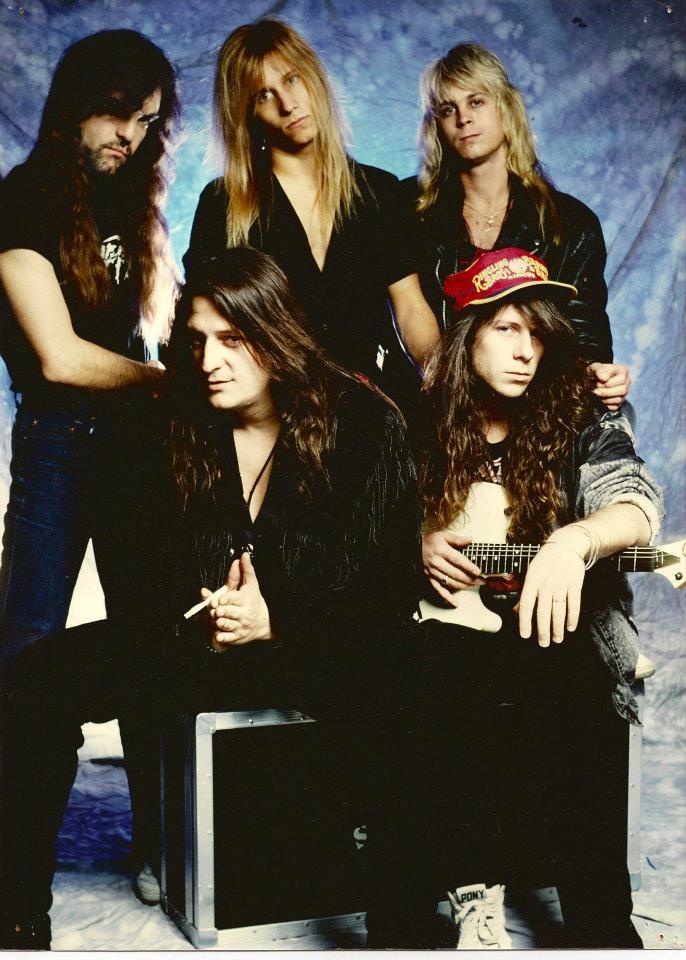
“And for all the roads you followed
And for all you did not find
And for all the things you had to leave behind…
I am the way
I am the light
I am the dark inside the night
I hear your hopes
I feel your dreams
And in the dark I hear your screams
Don’t turn away
Just take my hand
And when you make your final stand
I’ll be right there
I’ll never leave
All I ask of you
Believe”

